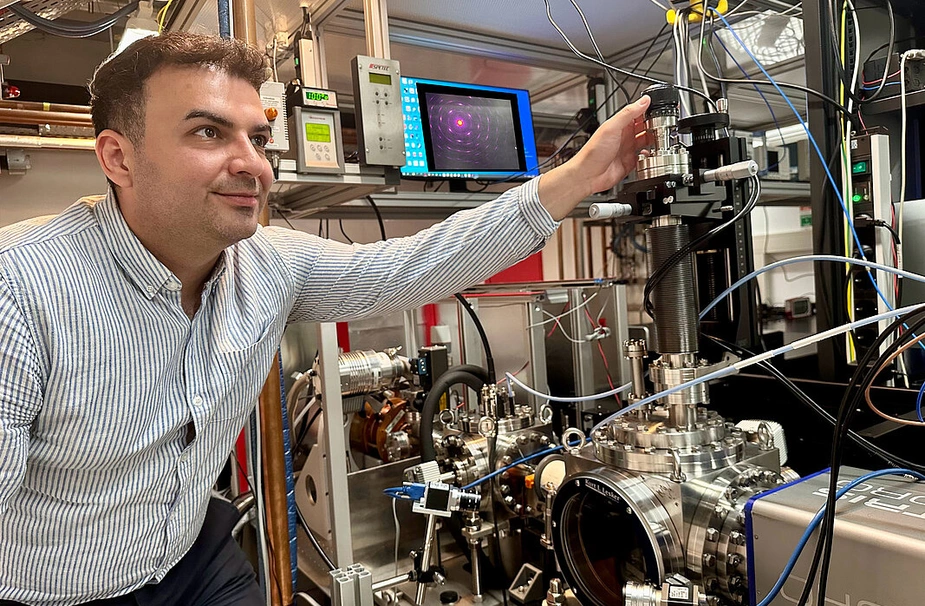Kasra Amini awarded €2.5 million of funding from the European Research Council
The MBI researcher wants to develop a tool to better track atomic changes in molecules and condensed matter during a reaction
Kasra Amini has been awarded the prestigious Starting Grant from the European Research Council (ERC). This highly competitive grant is given to exceptional early-career researchers with two to seven years of experience since completion of their PhD, who have demonstrated the potential to become leaders in their field. The ERC Starting Grant provides funding of up to €1.5 million, with an additional €1 million for start-up costs, such as the acquisition of major equipment, over a five-year funding period.
This funding enables recipients to establish full independence and build an excellent research team across all scientific disciplines. With this grant, Kasra Amini and his team will develop a novel and innovative technique that will add the energy dimension to existing ultrafast electron scattering measurements through a technique called time- and energy-resolved electron scattering (TERES). The TERES approach will allow the exploration of intricate coupled dynamics between electrons and atomic nuclei in gas-phase molecules and thin molecular films.
Kasra Amini is currently a group leader at the Max-Born-Institute (MBI) for Nonlinear Optics and Short Pulse Spectroscopy within the Forschungsverbund Berlin since 2021, and is completing his habilitation in the physics department of the Freie Universität Berlin since 2022. Before joining MBI, Kasra has worked as a postdoctoral researcher and research fellow at the Institute of Photonic Sciences (ICFO), Barcelona (2017 – 2021), within the attoscience and ultrafast optics group of Prof. Dr. Jens Biegert, and at University of Warsaw (2017-2018) in the quantum chemistry laboratory of Prof. Dr. Robert Moszyński. Kasra completed his PhD with distinction in Physical and Theoretical Chemistry at the University of Oxford (Merton College) in 2017 under the supervision of Prof. Mark Brouard (2017), following a First Class Honours in the MSci Chemistry with Mathematics joint honours undergraduate degree at University College London (2012).
Since joining MBI in 2021, Kasra established the high repetition rate ultrafast electron diffraction (UED) research group. Together with one PhD student and initial seed funding from MBI, we have built a state-of-the-art, high repetition rate UED instrument capable of tracking atomic changes in molecules and condensed matter with sub-atomic picometre and femtosecond spatio-temporal resolution.
Chemical reactions often involve electrons in molecules absorbing energy, which can cause the molecules to change their structure. These changes, though minuscule and extremely fast, are crucial to the reaction's outcome and the molecule’s function. Traditional methods have struggled to capture these rapid dynamics with the level of detail required to completely understand them.
The ERC project will address this challenge by combining two powerful tools: ultrafast electron diffraction (UED), which captures structural changes in molecules, and electron energy loss spectroscopy (EELS), which provides information about electronic states. Kasra and his team will develop this novel technique, called time- and energy-resolved electron scattering (TERES), to simultaneously monitor both the electronic and structural changes that occur during a reaction. This allows scientists to effectively create a "quantum molecular movie", offering a detailed, real-time look into how molecules change structure, dissipate energy and redistribute charge densities at the quantum level.
This potential breakthrough could have wide-ranging applications in various fields, from improving materials science to advancing our knowledge of fundamental photochemical processes. By providing a clearer picture of how molecules react and interact, TERES could lead to innovations in technology, energy, and beyond, opening new doors for scientific discovery.
ERC European Research Council’s press release
Contact
Max Born Institute for Nonlinear Optics and Short Pulse Spectroscopy
Dr. Kasra Amini
+49 30 6392-1245
kasra.amini(at)mbi-berlin.de
www.mbi-berlin.de
Press release MBI, 5 September 2024
